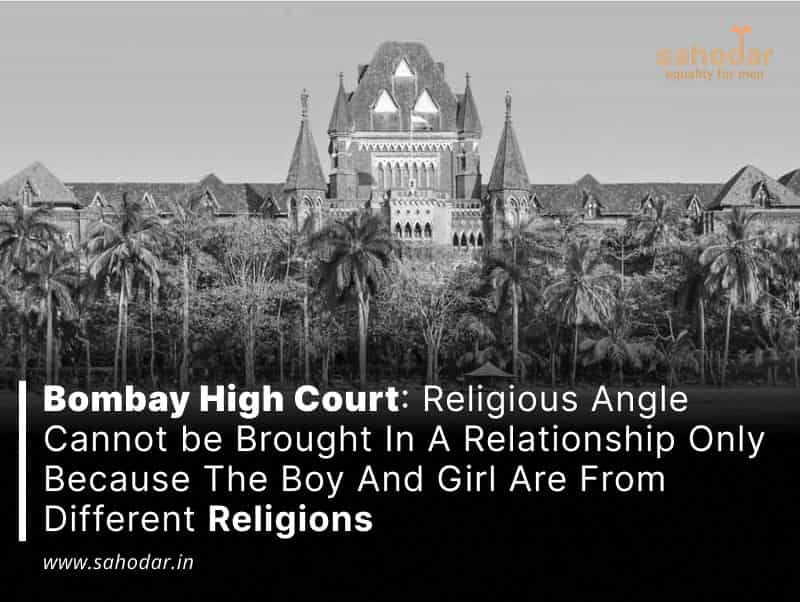The Aurangabad bench of Bombay High Court has recently ruled that a case cannot be considered a religious issue solely because a couple is from different religious backgrounds.
A Muslim woman and her family, who were accused of compelling a Hindu man to convert to Islam, have been granted anticipatory bail by the court.
The division bench of Justice Vibha Kankanwadi and Justice Abhay Waghwase noted that the accusations of “Love-Jihad” were unfounded, as the evidence suggested that the couple was genuinely in love and there was no evidence to support the allegations of forceful conversion.
The court stated that just because a couple is from different religions, it does not necessarily imply a religious angle to the case. Instead, it could simply be a case of two individuals who are in love with each other. The court further emphasized that the man had multiple opportunities to end the relationship but chose not to, indicating that his decision was driven by his love for the woman rather than any coercion.
The trial court’s decision to reject anticipatory bail for a woman, her parents, and her sister was overturned on appeal by the court. The appellants were facing charges under several sections of the Indian Penal Code, including extortion, abduction, causing hurt, insulting with intent to provoke a breach of peace, and criminal intimidation, as well as various sub-clauses of the Scheduled Castes and Scheduled Tribes (Prevention of Atrocities) Act. The court allowed the appeal, which means that the appellants will be able to secure anticipatory bail while the case is pending.
The informant claimed to have been in a romantic relationship with the woman and alleged that the appellant insisted on his conversion to Islam and forced him to undergo circumcision at a hospital. He also accused them of extorting money from him and assaulting him at gunpoint in front of a local MLA’s house while abusing him based on his caste.
The court noted that the informant had previously enjoyed a good relationship with the woman’s parents, and the issue of caste or religion did not come up until later.
The court found it surprising that despite the alleged demands for conversion and the abduction and forcible circumcision, the informant did not sever ties with the woman or lodge a complaint with the police. Additionally, he gave money to the woman despite these alleged incidents.
The court noted that despite the informant’s claim that the police did not record his report despite repeated attempts, he did not take the necessary steps to file a private complaint with the appropriate court.
The informant alleged that the offence occurred between March 1, 2018, and August 20, 2022, but the court deemed the lodging of the FIR at Kranti Chowk Police Station on December 2, 2022, to be an unreasonable delay that could diminish the significance of the story.
Furthermore, the court stated that since the foundation of the relationship was a love affair with no consideration of caste or religion, it cannot be deemed a prima facie case under the Atrocities Act.
According to the court, the informant had been trying to take action against the appellants since October 20, 2021, related to demands for religious conversion. When the Police Commissioner did not take any action, the informant filed a complaint with the Judicial Magistrate First Class. However, the court pointed out that in this complaint, the informant did not make any allegations of caste abuse. The Judicial Magistrate refused to send the matter for investigation, but it is unclear whether the informant challenged this decision. The court noted that the informant had disputed an affidavit that he had sworn, stating that the dispute between him and the woman was due to a misunderstanding and had been resolved. However, the court considered the affidavit at the prima facie stage since it was properly notarized.
The court concluded that based on the available evidence, it appears that no offense under the Atrocities Act has been committed. As a result, there is no restriction under Section 18 or 18A of the Act that would prevent the consideration of the application for anticipatory bail.
The court gave the benefit of doubt to the appellants as the medical evidence did not support the allegations in the FIR. While the police records indicate evidence of circumcision, the expert was unable to determine whether it was natural or due to surgical intervention, and whether it was performed by a medical professional or an unauthorized individual in the traditional Islamic way. The expert was also unable to determine when the circumcision occurred, according to the court.
Since most of the investigation has been completed and the charge sheet is about to be filed, and three of the appellants are women, the court determined that physical custody of the appellants is unnecessary.
The court instructed the woman’s father to attend the police station every Monday from 11:00 a.m. to 2:00 p.m. to assist with the investigation until the charge sheet is filed. The other three appellants, who are women, were not required to appear at the police station, but the Investigation Officer may summon them during the day if their presence is necessary.
Source: https://www.livelaw.in/news-updates/bombay-high-court-love-jihad-relationship-no-religious-angle-boy-girl-different-religions-222862?infinitescroll=1

